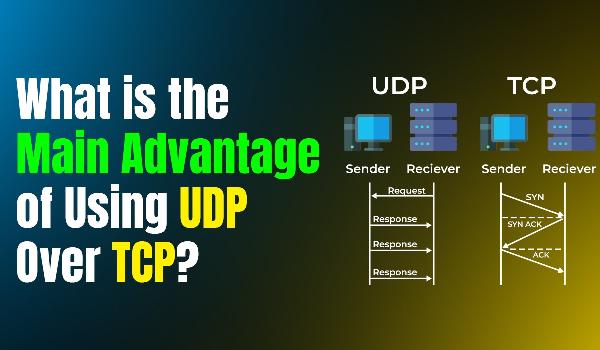What is the main advantage of using UDP over TCP?

Strong 8k brings an ultra-HD IPTV experience to your living room and your pocket.
Introduction
When it comes to choosing between network protocols, understanding the strengths and weaknesses of each is crucial. Two of the most common protocols are UDP (User Datagram Protocol) and TCP (Transmission Control Protocol). Each has its own set of advantages and is suited to different types of applications. So, what is the main advantage of using UDP over TCP? Let’s delve into the details and compare TCP vs UDP to uncover this.
Understanding UDP
Definition and Characteristics
UDP is a connectionless protocol that allows data to be sent without establishing a dedicated connection between the sender and receiver. It does not guarantee the delivery of packets, nor does it ensure that packets arrive in the correct order. However, this simplicity brings certain advantages.
Common Use Cases
UDP is commonly used in scenarios where speed is critical, and some data loss is acceptable. Examples include real-time applications like video streaming, online gaming, and VoIP (Voice over IP) services.
Understanding TCP
Definition and Characteristics
TCP is a connection-oriented protocol designed to ensure reliable data transmission. It establishes a connection before data is sent and includes mechanisms for error checking, acknowledgment, and retransmission of lost packets. This makes TCP a more reliable but also a more complex protocol.
- Common Use Cases
TCP is used in applications where data integrity and reliability are essential. This includes web browsing, email, and file transfers, where ensuring that all data is correctly received is critical.
Comparison Between UDP and TCP
- Connection Establishment
TCP requires a handshake process to establish a connection before data transfer begins. UDP, however, does not require this setup, allowing for immediate data transmission. This makes UDP faster in terms of initial setup.
- Reliability
TCP guarantees data delivery through error checking, acknowledgments, and retransmissions. UDP does not provide these assurances, which can result in packet loss or out-of-order delivery. This trade-off means that while TCP is more reliable, UDP can be faster and more efficient.
- Speed and Performance
TCP’s error correction and connection management introduce overhead that can impact performance and increase latency. UDP’s lack of these features results in lower latency and faster data transmission. This is particularly advantageous for applications where speed is more critical than reliability.
Main Advantage of UDP over TCP
- Lower Latency
The main advantage of using UDP over TCP is its lower latency. UDP’s lack of connection establishment, error checking, and acknowledgments means it can transmit data more quickly. This is crucial for real-time applications where delays can negatively impact performance. For instance, in online gaming or live video streaming, minimizing delay is essential for a smooth user experience.
- Reduced Overhead
UDP’s streamlined protocol results in reduced overhead compared to TCP. Without the need for connection management and error correction, UDP handles data more efficiently. This efficiency translates into faster transmission times and less processing power required for handling data packets.
- Suitability for Real-Time Applications
UDP is particularly well-suited for real-time applications where timely delivery of data is more important than ensuring that every single packet arrives intact. Applications such as VoIP, streaming services, and online multiplayer games benefit from UDP’s speed, even if it means accepting occasional data loss.
Practical Applications of UDP
- Streaming Media
UDP’s low latency is ideal for streaming video and audio content. It allows for the continuous delivery of media, ensuring that playback remains smooth even if some packets are lost along the way.
- Online Gaming
In online gaming, where real-time interaction is crucial, UDP’s speed helps maintain a responsive and immersive experience. The occasional loss of data is preferable to the delays that would be introduced by TCP’s reliability mechanisms.
- VoIP Services
VoIP services rely on UDP to provide clear and timely voice communication. The protocol’s quick data transmission ensures that voice calls are delivered with minimal delay, enhancing the quality of conversations.
Potential Drawbacks of UDP
- Lack of Reliability
One of the major drawbacks of UDP is its lack of reliability. Since it does not guarantee data delivery or order, some packets may be lost or arrive out of sequence. This can be problematic for applications where data integrity is crucial.
- No Congestion Control
UDP does not include built-in congestion control mechanisms, which can lead to network congestion if not managed properly. This can affect overall network performance and reliability.
FAQs - frequently asked questions
Q1. What is UDP used for?
UDP is used for applications that require low latency and can tolerate some data loss, such as streaming media, online gaming, and VoIP services.
Q2. How does UDP differ from TCP?
UDP is connectionless and does not guarantee data delivery or order, while TCP is connection-oriented and ensures reliable data transmission with error checking and acknowledgments.
Q3. Why might UDP be preferred over TCP for certain applications?
UDP may be preferred for real-time applications where speed is more important than reliability, such as in live streaming or online gaming.
Q4. What are some common applications of TCP?
Common applications of TCP include web browsing, email, and file transfers, where reliable data delivery is essential.
Q5. Are there any security concerns with using UDP?
UDP is less secure than TCP due to its lack of built-in error checking and connection establishment. Security measures should be implemented at the application level to address potential risks.
Conclusion
The main advantage of using UDP over TCP is its lower latency and reduced overhead. This makes UDP particularly suitable for real-time applications where speed is more critical than reliability. Understanding the differences between TCP vs UDP helps in selecting the right protocol based on the specific needs of an application, ensuring optimal performance and user experience.
Note: IndiBlogHub features both user-submitted and editorial content. We do not verify third-party contributions. Read our Disclaimer and Privacy Policyfor details.




